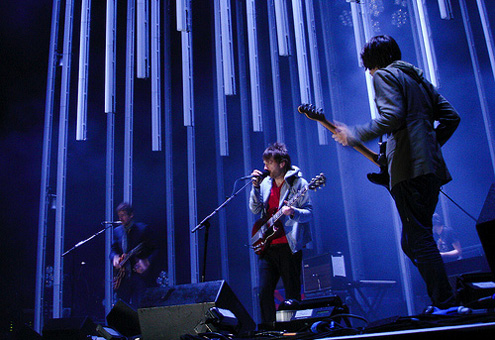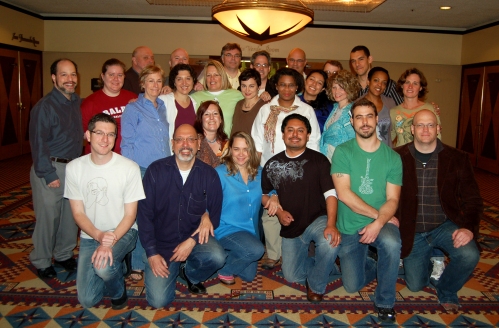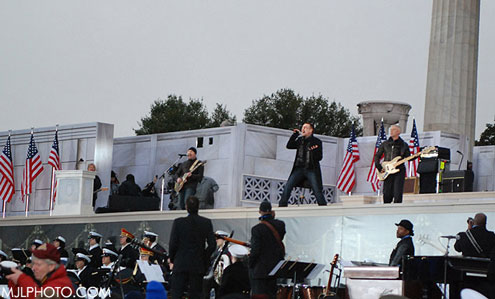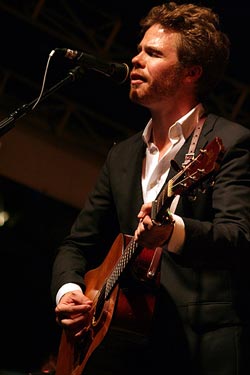
Radiohead rocks the Fortress of Solitude at Nissan Pavilion, Sunday, May 11, 2008. Photo by Luke S.
So, yeah, I was there . . . and here’s where I would ordinarily say “though no effort of my own,” since I came as the guest of the author of the Official Record of the concert. But it ended up being a major effort to get there, one in which hundreds, if not thousands, of Radiohead fans way more devout than me, failed. Biblical levels or rainfall compounded the piss-poor traffic management that has been a defining feature of Nissan Pavilion since it opened in 1995, and many would-be concertgoers, as we all know by now, sat in their cars, engines idling, for four or five hours before being told by the police to turn around and go home.
But since I was one of the lucky ones was actually inside the venue a couple of hours before Radiohead took the stage, I feel all the more foolish for not being able to offer much insight into the band’s performance, other than to state the obvious: I wish I could have seen it in dry clothes.
My benefactor had left DC late enough to have gotten the memo about the coming torrential rains, and had caparisoned himself appropriately in Gore-Tex. Once he arrived, he was escorted from the VIP lot by a Live Nation staffer with an umbrella.
Me? I’d left the District hours earlier, actually planning to stop somewhere along the W&OD trail and get a nice seven-or-eight-mile run in before heading out to my folks’ place in Chantilly to shower, take my mom out for an early Mothers’ Day dinner, and then cover the remaining third of the trek from Our Nation’s Capitol to Nissan Pavilion. I was dressed in a short-sleeved cotton shirt, a polyester jacked, an cotton jeans, which are excellent for retaining rainwater. As the day had gradually revealed its evil plan, I’d bailed on the run, and cajoled my folks to “dinner’ — in picturesque Centreville, another few miles down the road in the direction of Nissan — at 4:30 p.m. (My parents are now at the age where I really need to be careful about encouraging them to dine while most 9-to-5-ers are still at work.)
Anyway. I was parked in Lot F, about half a mile from the venue, when the gates opened at 6 p.m. In the four minutes it took me to jog from my car to the administrative office, every fiber of clothing on my body was soaked through, along with my notebook, my cel phone (which hasn’t made a call since), and my copy of The Ten-Cent Plague. (Since getting there crazy early was part of my plan, I brought a book. Yes. To a rock concert. Fuck you, Pal.) Having not a dry stitch anywhere on my body made the rest of the evening really enjoyable, especially when the high winds kicked up, driving little needles of rain flying in every direction and rendering the pavilion roof effectively useless.
So even though I had a ticket that thousands of fans would have committed premeditated murder to have — wrist-banded access to the general admission area right in front of the stage — I kind of feel like I didn’t see the show, because all I could think about was hopping up and down, trying to generate enough friction to warm myself up. Some vague sense that I was witnessing a truly commanding performance by a fiercely original and confident band did penetrate my consciousness, but the rambling account that follows is all I can piece together now. Reading some accounts of the concert today, I actually found myself wishing I was there. That’s funny. And truly bizarre.
The Peformance
I’m unfamiliar enough with Radiohead’s ‘tween OK Computer and In Rainbows catalogue that even if my notebook wasn’t soaked through and my fingers weren’t frozen, I probably couldn’t have compiled a setlist. It’s here and here.
After “All I Need,” the very, very subdued first song, with Thom Yorke playing piano with his back to the audience, he turns to meet his public: “Hello, Wet People! We’re having problems with the wet.”
Later on, he gets all mushy: “We know how tough today has been for you guys. Sorry. This is a nasty summer. It’s not nice.”
Perhaps out of solidarity with the crowd (or perhaps because it was warmer under the stage lights), no member of the band was bundled up. Ed O’Brien was wearing a scarf and sport jacket that seemed chosen more for sartorial flair that for warmth, and Yorke was in an unzipped hoodie sweatshirt over a T-shirt. Colin Greenwood actually took off a layer, performing much of the show in a T-shirt.
Jonny Greenwood looked at his shoes throughout the main set, but Colin, Ed, and Thom interacted with the crowd to greater degree than I’d expect from these guys. Thom had a spastic little dance to begin all of the upbeat numbers, when he wasn’t playing piano, and there was a lot of audience eye-contact from him.
For the second half of “15 Step,” O’Brien put down his guitar and picked up what looked like giant remote control for some kind of toy airplane. It wasn’t obvious what he was controlling with it — samples or loops, maybe — but he was very animated with the thing, posing with it in kind of a parody (I guess) of the kind of guitar theatrics from which he generally abstains.
Thom played along with Phil Selway using a little toy-looking drum kit brought to the front of the stage for him on one song. It would be nice if I could actually identify the song, but no. (This is where not being able to take notes really hurt me. Wet pages and frozen fingers = no notes.)
The stage set was sort of minimalist by big-rock-show standards, but very cool, with dozens of vertical filiments suspended from above flashing various colors and patterns in time with the songs. The video panel behind the band, meanwhile, showed processed and color-washed live video of the band performing, shot from dozens of angles — there must have been little cameras hidden all around the stage, but you couldn’t see any of them from the audience , so that was cool.
There was a great moment when the band played “Paranoid Android,” and the whole place joined in for the “rain down, rain come down lyric” that comes two-thirds of the way through the tune right on cue, followed by the sound of thousand of people laughing. Even some of the guys onstage smiled at that. Not Thom. But others.
Which brings me to an important point . . .
The Audience
The Radiohead Nation was utterly fantastic, enthusiastic and demonstrative despite the rain-shrapnel throughout the show. They still cheered, they still sang. You couldn’t tell if the band were at all moved by this, but they sure should have been. As with every concert I’ve ever seen with this kind of configuration, the people with the worst tickets (farthest from the stage, completely exposed to the elements, though I did see dozens of plastic tents out there) were the most vocal. The people with the primo tickets, the general admission pit, where I was, were way more subdued, which sucks, but still pretty fired up.
Exit Music (For a Film I Never Want to See Again)
During the encores, while I was wandering around trying to find my car (since I’d been sprinting for shelter when I’d left it hours earlier, I’d neglected to note which row of lot F I’d left it in), my feet sinking a half-inch into the muck with every step, I recognized “Karma Police,” “Planet Telex” and the rarely-performed “Fake Plastic Trees,” dedicated, I’ve since read, to all those who couldn’t get in.
I have left concerts early exactly twice in my life. The prior time was in 1995, at a Cranberries concert at the then-brand-new — wait for it — yes, Nissan Pavilion at Stone Ridge. God, how I hate that place. And now that U2 has signed with Live Nation, Nissan’s owner/operator, for next three tours (12 years), what’s the over/under that their next “DC” show will take place 35 miles West of town?


 I’m so honored and excited I’m sweating. Yes, it’s 70 degrees and muggy here in DC this December 4th, but it isn’t the climate that has me — svichting? Swatching? Whatever. It’s the fact that Andy Cirzan, my yulemix-making senpai, sent me his 2012 Christmas mix CD.
I’m so honored and excited I’m sweating. Yes, it’s 70 degrees and muggy here in DC this December 4th, but it isn’t the climate that has me — svichting? Swatching? Whatever. It’s the fact that Andy Cirzan, my yulemix-making senpai, sent me his 2012 Christmas mix CD.

















